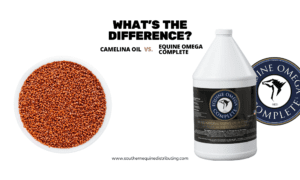Allergies in horses can be difficult to manage, commonly affecting the respiratory system and skin.
Horses afflicted with allergies often experience coughing, nasal discharge, itching, and hives. This is due to an exaggerated immune response to stimuli in the horse’s environment, such as mold spores, dust, or insects.
It is known that omega-3 fatty acids have anti-inflammatory properties and can aid in regulating the inflammatory response that results from allergens.
Feeding an omega fatty acid supplement such as Equine Omega Complete can decrease a horse’s ability to react to an allergen by positively impacting the horse on a cellular level.
Unlike most plant-based omega supplements on the market, Equine Omega Complete contains both EPA and DHA, known to have potent anti-inflammatory effects, reducing allergy symptoms.





